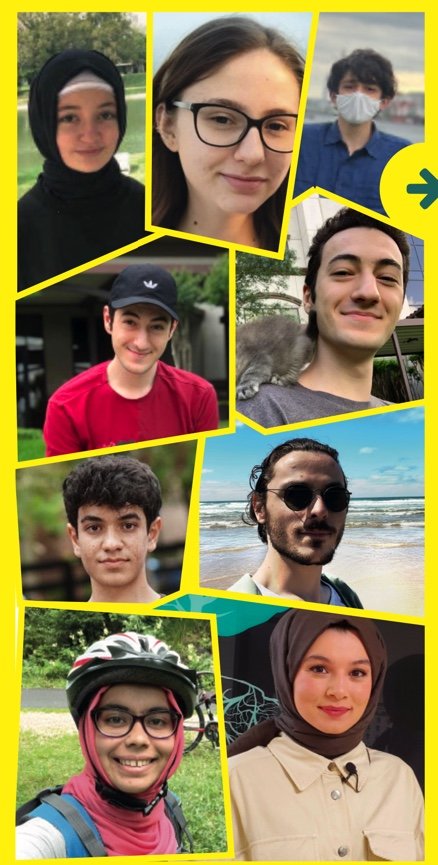And Here Are the Young Ones!
And Here Are the Young Ones!
As parents/adults, while we oscillate between assimilating and integrating, striving to hold our ground in different geographies; wrestling with making connections, learning a new language; unfortunately, at times, we overlook the feelings of our young ones who grapple with the same troubles, and even earlier in life! Yet, these shared troubles could be seen as a great opportunity to forge deeper and stronger bonds with them.
Each of the young individuals gracing the cover story of this issue has become a living example of what we have been saying so far through their life experiences. They have shown respect for themselves and the values they hold dear; they can set boundaries, say no when necessary; even though they may falter at times, they have managed to take on the responsibility of worship, striving to prove that one can exist with a dual identity in a foreign country, and most importantly, their efforts to do justice to their conscience and willpower are the clearest evidence of this!
We, as adults who have taken up our professions, established our homes, delved into family life, whether as parents or elder siblings, often love to give our opinions on everything and offer advice for every problem, if possible. Especially when faced with a younger interlocutor, we tend to start with the phrase, "When I was your age..." and the pithy examples we offer seem never-ending. This is a side of us that young people don’t particularly appreciate. Don't be fooled into thinking I'm an elder reliving memories just because I keep mentioning the younger generation! But as the old saying goes, times have changed; eras have transformed. Nowadays, even a few years can differentiate generations. Our experiences in the geographies where the majority of the population is Muslim, where everyone, even culturally, tries to perform religious rituals, are quite different from the experiences of young people trying to establish/maintain their identity with a minority psychology abroad.
Of course, we didn’t spend our high school and college years idyllically. We had our own troubles, our own challenges. However, when compared to the challenges and privileges of today's generation, our exams and blessings were quite different. Despite our struggles, we are indeed inhabitants of different worlds compared to today's youth. Today, as people who have left our education years behind, it's clear that we have little idea of what happens behind the school doors! And there's more: it’s difficult for us to understand how exhausting it can be to try to be "different from everyone else" in a minority society. Especially if we don’t have an active professional life or educational process in the country we live in.
We can only know what our children, siblings, or nieces experience in their educational environments or with their friends through what they tell us. And we can only know as much as they share if we can actively listen, free from our anxieties, fears, and judgments! Unfortunately, most of the time, when they tell us something, we tend to be more concerned with "what happened" than "how they feel." Who knows, maybe because of our anxious listening, they keep the storms raging in their souls hidden from us!
It would be nice if each of them could resolve the ebb and flow between assimilating and integrating in a foreign country, the fluctuations at the crossroads, in our harbor, free from judgment, accusation, and imposition. If only they could see us as a safe embrace, despite everything they have done, right or wrong. I believe that to prepare such a peaceful embrace, we first need to find that magical serenity somewhere in our own world.
As parents/adults, while we oscillate between assimilating and integrating, striving to hold our ground in different geographies; wrestling with making connections, learning a new language; unfortunately, at times, we overlook the feelings of our young ones who grapple with the same troubles, and even earlier in life! Yet, these shared troubles could be seen as a great opportunity to forge deeper and stronger bonds with them. Saying, "I struggle too! I'm scared sometimes," can create a reassuring effect that shows young people that we adults aren’t perfect either, and it might make them feel, "I’m not alone either." Turning trials into blessings can become a guiding compass for discovering our "uniqueness" amidst the "multiplicity" that we often overlook.
It's strange that I feel like I've found the combination of all the cover topics I've prepared before in this issue. Some of you might remember. In our dossier titled "Visa Requirement in Privacy Education," we talked about the importance of teaching a child self-respect and anger management. We even tried to draw a roadmap for parents on this issue. In our cover story titled "How Will These Children Love Worship?" we emphasized, "The earlier a child is introduced to and practices religious values, the more beneficial it is, provided that it is in proportion to their dose! If the seeds are sown well and fertilized with care, the tree will flourish beautifully when the time comes." In our piece titled "I Chose to Be a Host
/ / / / / / / /

